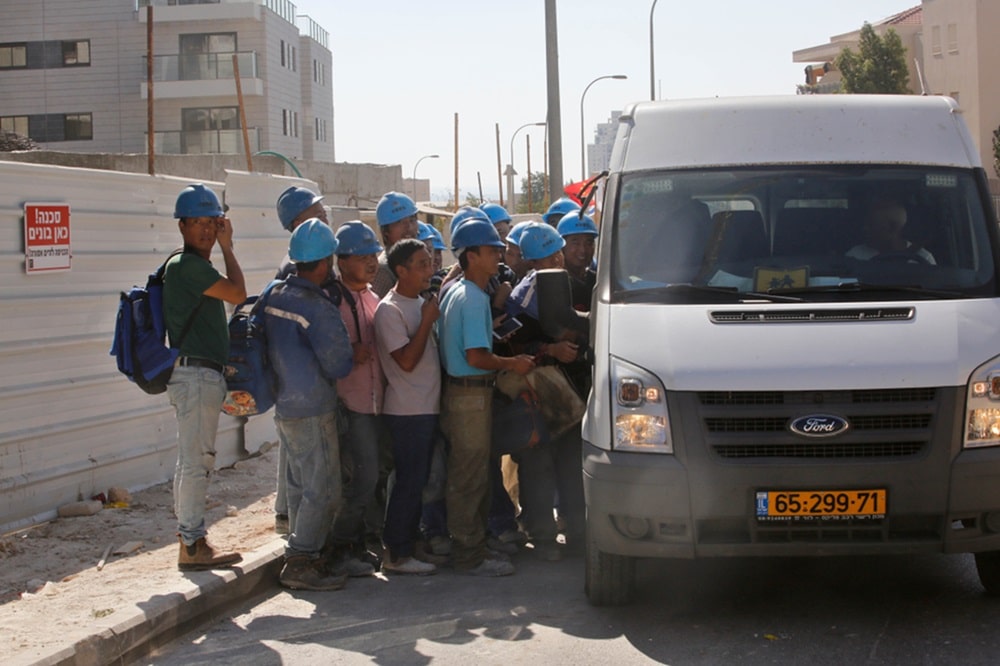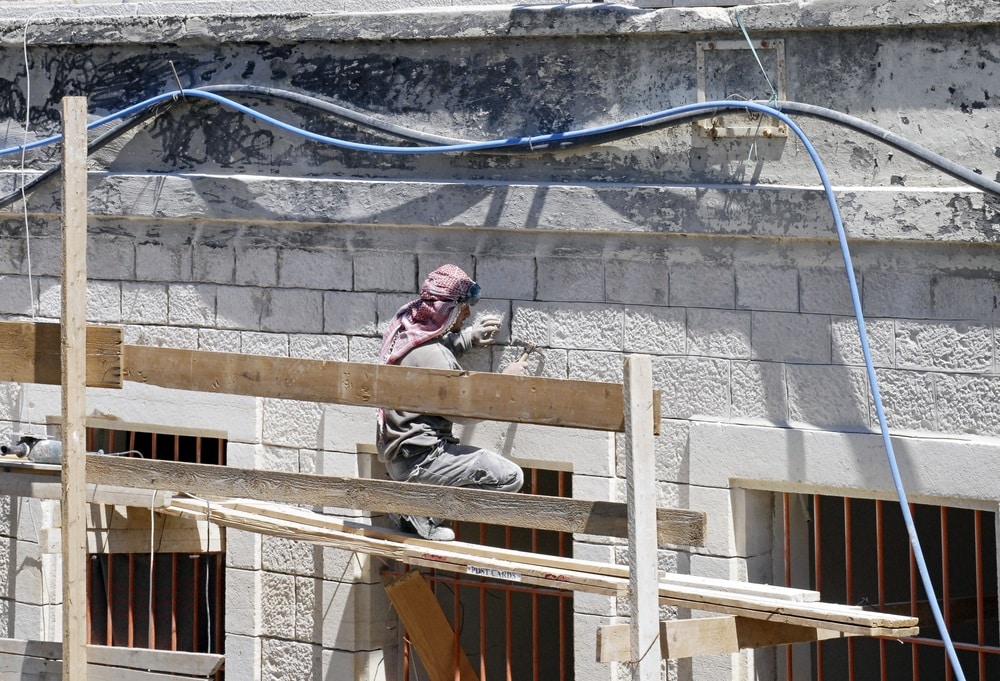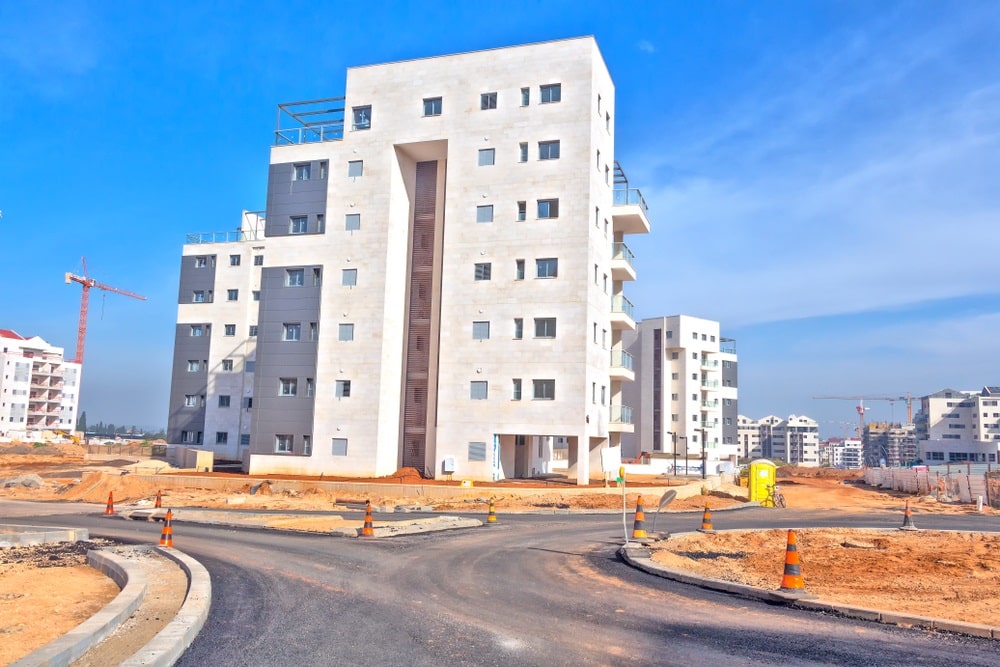
Since the War of Iron Swords broke out, Israel’s construction sector has suffered severely. And recovery is nowhere in sight. Eran Rolls, chair of the Israel Construction Center, explains the coming impact of the sector’s difficulties on everybody’s pocket, but he also sends an optimistic message: “There’s a historic opportunity here to stop depending on Palestinian laborers.”
One of the first steps the IDF took on October 8 was to close off Judea and Samaria, meaning that Palestinian construction workers were prevented from entering Israel. At the same time, the Home Front Command issued guidelines that imposed restrictions on work at construction sites around the country — because of wartime directives regarding safe areas, among other things. The municipalities and local authorities also responded to the war, many deciding to suspend all construction initiatives in their territory. As a result, most construction sites in Israel were paralyzed for anywhere between several days and several weeks. Some have not yet returned to operation.
That response was appropriate and correct, but it dealt a severe blow to the Israeli construction sector. “What’s happening here at this moment is a major drama,” stresses the chair of the Israel Construction Center, Eran Rolls. “Projects all over the country are held up, and there are significant delays in transferring apartments to the buyers. It affects everyone, and the first to suffer is the state.”

No transactions, no taxes: The effect of the real-estate crisis on the national budget
In Israel’s construction sector, difficulties began long before the War of Iron Swords. Over the years, prices rose significantly for many items important to the sector. According to Rolls, land that once cost 70–80 thousand shekels costs 400 thousand shekels today. And on top of that, as if it weren’t enough, come VAT, land improvement tax, and the tax on foreign workers. All those taxes have risen significantly. The latest financial decree was the leap in interest rates, which reduced buying power and, as a result, also reduced the demand for homes. Under those challenging conditions, the war broke out and the construction sector, already staggering, suffered another jolt.
Eran Rolls stresses that the difficulties in the construction sector radiate into other sectors as well. “There are enormous industries that depend entirely on the construction sector, such as manufacturers of building materials, concrete blocks, flooring, kitchens — and they’ll all suffer,” he warns. “Of course the smaller companies and the individuals who deal with the sector, such as architects, engineers, and interior designers, also have their share of the price to pay now and in the future.” That collateral damage also affects Israel’s economy. “The country’s cash flow is headed for an abyss. A quarter of the national budget comes from takes on real-estate transactions, and without transactions there are no taxes. We’re talking about revenues of around 120 billion shekels a year, and in the coming year, by my estimate, we’ll see a shortfall of 40 to 60 billion shekels in the national budget from that accumulated damage alone. However you look at it, if the contractors have it bad, the country has it worse. I don’t know whether the leaders haven’t understood that, or whether they’ve chosen to keep it from the public.”
Reliance on Palestinian laborers: The historic opportunity to stop the plague
Before the War of Iron Swords, roughly 80 thousand laborers from Judea and Samaria were officially working in Israel, plus roughly 20 thousand from Gaza and roughly 40 thousand illegals. Some of the illegals returned to work in Israel, despite all the difficulty involved, but the workers with permits haven’t returned to Israel since October 7.
At the same time, many workers in the sector — including foremen and engineers — were called to duty immediately upon the outbreak of war, as foot soldiers and officers in combat reserve units. A considerable portion of them are still on active duty, further deepening the shortage of workers.
Various voices are calling for the simple solution: allowing the Palestinians back into Israel to work. According to Eran Rolls, such a thing must by no means be allowed to happen — not now, and not later on. “The State of Israel has developed a reliance on Palestinian laborers, and there’s a historic opportunity here to get rid of that reliance and cancel all the Palestinian laborers’ permits for entering Israel.”
Rolls explains that the Palestinian laborers create many problems for the construction sector and endanger Israel’s security. “Everyone in construction knows that the Palestinian workers do intentional damage for nationalistic reasons. And that damage adds up int the billions per year,” he says. “They sabotage the plumbing, they clog drainpipes with tar, they stream water into the circuit breaker boxes — you name it. Because the vandalism is so common and so well known, the contractors already include it in advance among the expenses that they roll onward to the customer.”
Moreover, many painful instances have demonstrated that some of the laborers are also involved in terrorism against Jews. Only recently, an unauthorized Palestinian laborer mounted a stabbing attack in Gan Yavne and a 17-year-old boy was seriously hurt. “Since October 7, we’ve been seeing an uptick in the Palestinians’ motivation for terrorism, and it doesn’t matter whether they’ve come from Gaza or from Judea and Samaria,” Rolls states. “I’ve always argued that those laborers are dangerous, and now I’m not willing at all for them to stroll around the streets here. I believe that every mayor who lets Palestinian laborers work at construction sites under his jurisdiction is an accessory to any further terror attack that happens.”

The labor shortage: We asked for 100 thousand laborers, we received 1,000
The chair of the Israel Construction Center firmly opposes allowing Palestinian laborers to return to work in Israel, but he also knows that without laborers, the contractors will be simply unable to meet their obligations.
He suggests two solutions that could fill the ranks. The first, and faster, is to bring foreign workers, and the second is to train Israeli laborers. He says that neither solution is being pursued at the required speed or scale. “We asked the state to allow a hundred thousand foreign workers in, and since the start of the war we’ve received only one thousand. That’s absurd, and it’s frustrating because thousands of laborers are just waiting to be permitted to come to Israel.”
Rolls notes that even if the state does admit the necessary quota, bringing all the laborers will still be a problem because there are no lodgings for them. “The Palestinian workers go home to sleep, but foreign workers need to be given a place to stay,” he explains. “In many countries of the world , it’s common to set up villages for them with hostel-like accommodations and with all the necessary everyday services such as a supermarket, clinic, and gym. We must set up four or five villages like that in Israel, and we certainly can, but like everything else in the country — it’s not getting planned and it’s not getting done.”
The second solution to the labor shortage is, as mentioned, to train Israeli workers. Here, in contrast, the state is trying to take action and has even inaugurated a program for encouraging employment in the construction and agricultural sectors, offering monetary grants to Israelis who undertake such jobs. According to Rolls, the incentive may do some good; but before significant change can be generated, Israelis must be re-educated about the construction sector.
“Israelis don’t like to work in construction. Apparently it’s not engrained in the Jewish DNA,” he says. “In my opinion, that’s a great shame because people don’t understand that there are different kinds of jobs in this sector. Besides building and plastering, there are interesting jobs you can make your way to, like planning air conditioning and like installing smart electrical systems. It’s also possible to earn big money. A talented person can become a foreman or a contractor and can establish a meaningful, profitable career. I’m always saying that training Israeli workers is the most important thing for the construction sector, and I try to convince young people to enter the workforce but, to my regret, there’s not enough response.”

Apartments at half price? That may be the way to thank reservists
Eran Rolls doesn’t try to hide the depth of the Israeli construction sector’s troubles, but he’s also prepared to point out some glimmers of light. The first is a marked improvement in enforcing safety. “In recent years we’ve seen cases where company owners went to jail because of work accidents at their building sites. That was certainly a deterrent,” he recounts. “Today every contracting company pays great attention to safety and makes sure to enforce all the procedures. I’m happy to say that the improvement is significant.” Another point of light has to do with the building methods, which are constantly becoming more sophisticated. Rolls stresses that although processes are more efficient under the new methods, and employees are safer, still the improvements are no substitute for workers.
There is also cause for hope, Rolls believes, in the new wave of Jewish immigration from the Diaspora. Although that wave is driven by a regrettable rise in ant-Semitism, still it does bring new residents here and they are an important market for real estate. “We’ve opened a counselling center for new immigrants who are looking for a home in Israel,” he reveals. “Of course, if we have no workers we can’t provide homes. But there definitely is potential here for growth in the construction sector.”
As the interview nears its end, Rolls asks to propose an idea that could help both the fighting forces and the Israeli economy. “I think that the reservists and the draftees who have fought in the current war deserve the privilege of buying an apartment in the periphery at a 50 percent discount,” he says. “The state wouldn’t need to put up a single shekel, it would merely receive less revenue from those transactions. I see it as a way of thanking the fighters. The nicest bonus we could give them. And I’d like to see it happen.”






